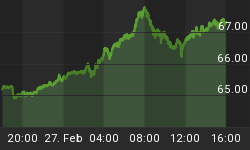With the US dollar trading at a five-month low, spare a thought for non-US investors invested in US stocks and bonds.
The graph below compares the performance of the US 10-year Treasury Note in US dollar terms (green line) with the same bonds from the viewpoint of a European investor (red line). (Although I am using the euro in this example, the same logic applies to most other non-US dollar currencies.) Since the peak of the US dollar against the euro on March 5, US investors have lost 2.6% on their Treasury investments, but euro investors are completely under water to the tune of -11.9%. The year-to-date numbers are down by 5.6% (US dollar) and 5.7% (euro) respectively.

Source: StockCharts.com
The next graph shows the S&P 500 Index in both US dollar terms (green line) and euro terms (red line). Whereas US investors have every reason to be pleased with a huge return of +27.7%, euro investors received a less sterling but nevertheless palatable +15.6%, given the magnitude of the rally. For the year to date the figures are +0.8% (US dollar) and -0.7% (euro).

Source: StockCharts.com
In the words of Richard Russell (Dow Theory Letters): "The US Dollar Index is sitting on what I term 'the edge of the cliff'. If the dollar falls apart, we're dealing with a whole new story - it will affect almost all investments, US and foreign. The sliding dollar is already putting pressure on Treasury bonds, particularly the long-term 30-year maturities. This is causing our creditors (think China) to cut back."
Will the greenback turn out to be the Achilles heel of the US economy?
Did you enjoy this post? If so, click here to subscribe to updates to Investment Postcards from Cape Town by e-mail.















